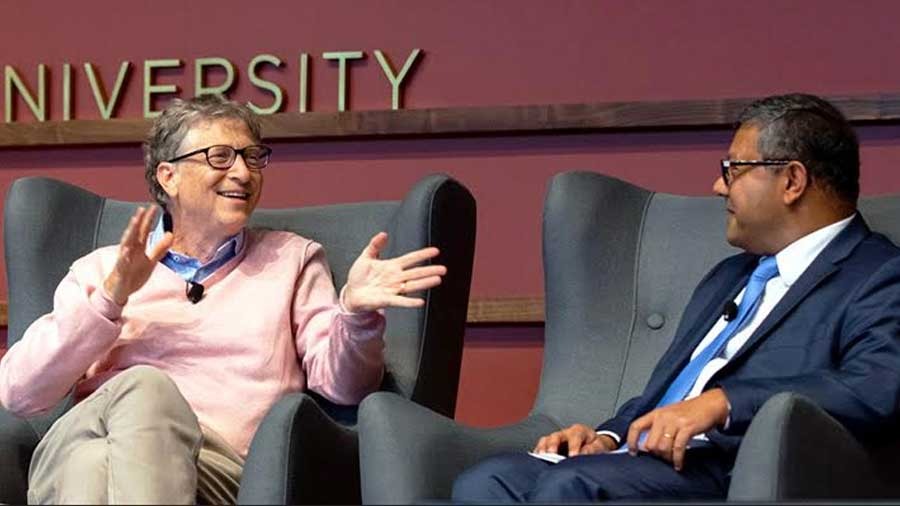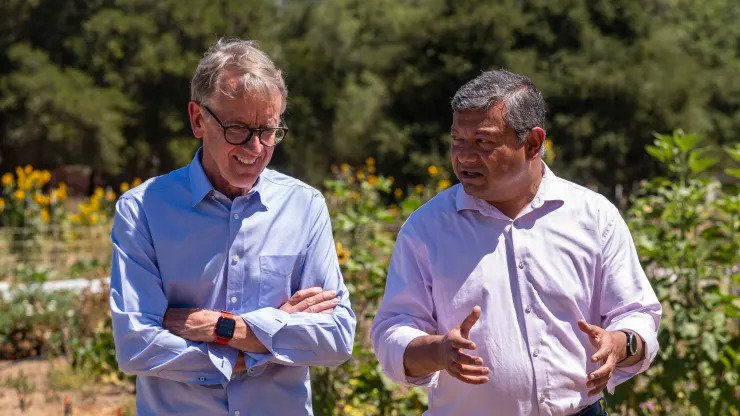(May 20, 2023) As the world grapples with an energy crisis and the urgency of climate change, we find ourselves standing at the crossroads of a new era. The decisions made today about energy production and consumption will shape the world for generations to come. This epoch calls for visionaries who can understand the intricacies of the crisis and catalyse a shift towards sustainable alternatives. Among the leaders in this space is Dr. Arun Majumdar, a materials scientist, engineer, and educator, whose remarkable work in energy research and policy-making has charted a new path toward a greener future.

The Global Indian, who had a very humble beginning in Kolkata, eventually rose to prominence in the world of energy research and policy. Currently the Jay Precourt Provostial Chair Professor at Stanford University and a key figure in energy policy development, the scientist is also the Director of the Advanced Research Projects Agency-Energy (ARPA-E). From working with two US Presidents – Barack Obama and Joe Biden – to shaping energy policies, Majumdar’s journey is a fascinating testament to the transformative power of scientific endeavour. “As is often said, we do not inherit the Earth from our ancestors; we borrow it from our children. We must collectively figure out how to create a future where humans and nature thrive together,” the scientist said during a speech he made recently.
Rising from the ashes
Born into a family of globetrotters and nurtured amidst diverse cultures, this accomplished scientist has a career trajectory that speaks volumes of his intellect, innovation, and impact. The scientist’s father was a government-employed engineer and his mother, was a scholar proficient in Sanskrit. Like many middle-class families in that era, they used coal for cooking. The polluting effects of coal were evident from the visible smoke it emitted, yet it served the unintended benefit of deterring some mosquitoes. “My mom used to cook on a coal stove,” the scientist shared during an interview, adding, “It was a mud stove with coal in it, and there was room for air to flow. You burn it and you make your rotis, curries, and other stuff on it.”

A childhood image of Dr. Arun Majumdar
A studious child, who was always at the top of his class, Dr. Arun Majumdar was a student at Mayo College, a private boarding institution located in Ajmer, Rajasthan, India. The school fees posed a significant financial challenge for his parents, and were “tough on the family”. The scientist shared, “They valued education because they lost everything when they moved during the partition, so to get ahead in life, it was education.”
Following his tenure at boarding school, Majumdar successfully cleared a demanding entrance test to secure admission into the prestigious Indian Institute of Technology in Bombay, from where he graduated in 1985. He then continued his academic journey at the University of California, Berkeley, where he completed his master’s degree and subsequently earned his Ph.D. in mechanical engineering in 1989.
Interestingly, the scientist was drawn to Berkeley, in part, due to his father’s prior visit for a telecommunications training program. His father’s effusive praise and portrayal of Berkeley as a kind of paradise left a deep impression on him, further influencing his decision. Unfortunately, his father did live long to see his son graduate. “But, I was able to fulfill his dream,” shared the scientist, during a recent interaction.
Driving changes for a better tomorrow
Soon after finishing his Ph.D., the scientist went ahead to work in a few corporate companies, Eventually, in 1997 Dr. Arun Majumdar joined the University of California, Berkeley as the Almy and Agnes Maynard Professor, where he continued to work for 13 years, with a focus on thermoelectric materials, heat and mass transfer, thermal management, and waste heat recovery. It was during this time, while he was serving as a faculty member at Berkeley, that the scientist started doing research work at the Lawrence Berkeley National Lab. It was here that he encountered Steven Chu, a figure who would later ascend to the role of U.S. Energy Secretary during President Barack Obama’s tenure.

Dr Majumdar with Bill Gates during a conference
Realising the scientist’s dedication and brilliance, Chu selected him to spearhead the Advanced Research Projects Agency–Energy (ARPA-E), a body analogous to DARPA, but for energy. “I was nominated in September; by my third week of October, I was there,” he shared, adding that the move was unforeseen, leaving him to reside temporarily in Chu’s basement for a week until the scientist could locate a suitable accommodation for himself in Washington.
Dr. Majumdar worked on three very important energy missions during his tenure at the ARPA-E – reducing greenhouse gas emissions, energy security, and energy efficiency. The idea was to build the new energy industries of the future. And it was under his leadership that the US market started exploring the EV market. “One of our programmes is on next-generation transportation batteries. These would make electric cars have a longer range and a cost comparable to today’s gasoline-based cars, so that electric cars could be sold without subsidies. We’re also working on an entirely new way to make fuel, by using microbes that can convert electricity into oil,” the scientist said, adding, “We’re also working on motors, from electric vehicles to air conditioning compressors. We are investing in problems now, to try to make the US less vulnerable and more competitive.”

Dr. Majumdar with John Doerr, chairman and co-founder of Kleiner Perkins Caufield
In 2012, the scientist left Washington and joined Google as the company’s Vice President for Energy. However, despite loving his job, he couldn’t stay away from academics, and two years later he became the inaugural dean of the Stanford Doerr School of Sustainability. “The insights I gathered during my time at ARPA-E are now instrumental in shaping the accelerator division at the Stanford climate school. Jokingly, we call it ARPA-S for sustainability, because it’s all about impact. At ARPA-E, the discussion around scale was insufficient. However, when it comes to climate and sustainability, scale is essential. If the solution, whether it’s a technological advancement or a policy, doesn’t scale up, it simply doesn’t make a difference,” the scientist explained.
In November 2020, the scientist was designated as a voluntary contributor to the Joe Biden presidential transition Agency Review Team. His role involved facilitating transition efforts connected to the United States Department of Energy, the Federal Energy Regulatory Commission, and the Nuclear Regulatory Commission. “I hope our grid is modernised to integrate renewable energy generation. I’m pretty sure the cost of renewable energy will be comparable to or cheaper than electricity from fossil sources. Current trends suggest that this will be the case,” he shared during a speech at Stanford.
- Follow Dr. Arun Majumdar on LinkedIn
Also Read: Celebrating excellence: Scientist Subra Suresh receives National Medal from President Joe Biden




